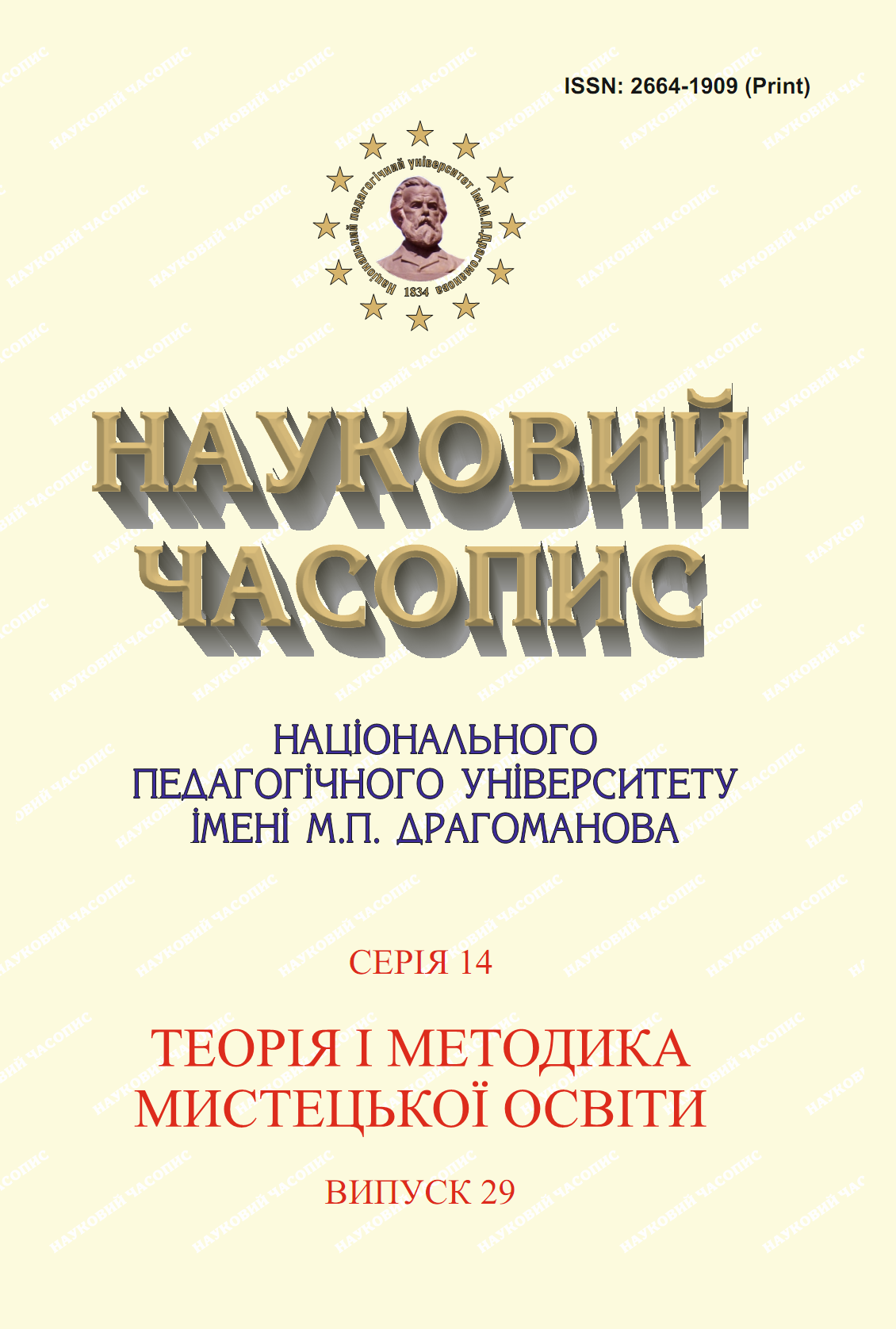"Music and creative ability" as a scientific category in philosophical and psychological and pedagogical research
DOI:
https://doi.org/10.31392/NPU-nc.series14.2023.29.02Keywords:
abilities, musical and creative abilities, creative development, musical creativity, giftednessAbstract
The article reveals the peculiarities of the formation of the concept of "musical and creative abilities" in the psychological and pedagogical literature. The problem of creating opportunities for structuring musical abilities is considered. The general-theoretical approaches to the problem of the development of musical abilities, which ensure the effective formation of important personality qualities, are characterized; examination of the phenomenon of creativity in philosophical studies, psychological and pedagogical scientific literature on the problem of the development of musical abilities in the gradual stages of their development was analyzed. At all stages of the evolutionary development of society, people aspired to creativity and admired the ingenious creations of masters in various spheres of activity. Numerous works in the fields of philosophy, psychology and pedagogy, as well as art history, are dedicated to highlighting its features. Developing and enriching her knowledge, scientists tried to explain this unique phenomenon. In the field of art, creativity has its own characteristics. In particular, music psychologists and teachers emphasize that in this field of activity it always manifests itself individually. Such a feature of creativity is determined by the tasks of art - to reflect not just the surrounding world, but the world as the artist sees it. Creativity is a process of activity in which qualitatively new material and spiritual values are created. The main criterion that distinguishes creativity from manufacturing or production is the uniqueness of its result. The fruitful flow of the creative process is facilitated by creative abilities - individual characteristics of a person, which are subjective conditions for the successful implementation of a certain type of activity. They are not reduced only to the accumulation of knowledge, abilities and skills, but are manifested in the speed, depth, strength and duration of mastering the means and methods of activity.
References
Моляко В. Здібності, творчість, обдарованість: теорія, методика, результати досліджень. Колективна монографія за редакцією В.О. Моляко. Житомир, 2006 , С.38-115
Реброва О. Методологія і методи досліджень педагогіки мистецтва. навч.-метод. посіб. для студ. і магістрантів ін.-тів мистецтв. пед. ун-тів. Південноукр. нац. пед. ун-т ім. К. Д. Ушинського. Київ, 2011. 84 с.
Кашкадамова Н. Мистецтво викладання музики на клавішно-струнних інструментах (клавікорд, клавесин, фортепіано) XIV- XVIII ст. навч. посібник для студентів музичних вузів. Вищий держ. музичний ін-т ім. М.Лисенка. "Астон". 1998, С. 299
Кірнарська Д. Психологія спеціальних здібностей: Музичні здібності. Таланти ХХІ століття, 2004.
Клименко В. Психологія творчості: навч. посіб. Центр навчальної літератури, Київ, 2006, С. 480
Моляко В. Психологічна готовність до творчої праці. Знання, 1989, С. 48
Кірнарська Д., Киященко Н., Тарасова К., ред. Ципіна Г. Психологія музичної діяльності: теорія і практика. Навчальний посібник для студентів муз. фак. вищих навчальних закладів. «Академия», 2003, С. 368
Роменець В. Виховання творчих здібностей у студентів. навч. посібник. Київ, 1973. С. 96
Стратан-Артишкова Т. Теоретичні і методичні основи творчо-виконавської підготовки майбутнього вчителя музичного мистецтва в системі вищої педагогічної освіти. Автореф. дис. д-ра пед. наук, НАПН України, Ін-т пед. освіти і освіти дорослих. Київ, 2015.
Енгельмаєр П. Психологія творчості. Книжний дім "Ліброком", 2010, С. 208 .
Choksy L. Teaching musicin thet wentieth century / L. Choksy. -New York : EnglewoodCliffs : Prentice-Hall Cop., 1986. 343 p.
Downloads
Published
Issue
Section
License
Copyright (c) 2023 Scientific journal of National Pedagogical Dragomanov University. Series 14. Theory and methodology of arts education [ Naukovij časopis NPU ìmenì M.P. Dragomanova. Serìâ 14. Teorìâ ì metodika mistecʹkoï osvìti ] ISSN:2664-1909

This work is licensed under a Creative Commons Attribution-NonCommercial-ShareAlike 4.0 International License.

